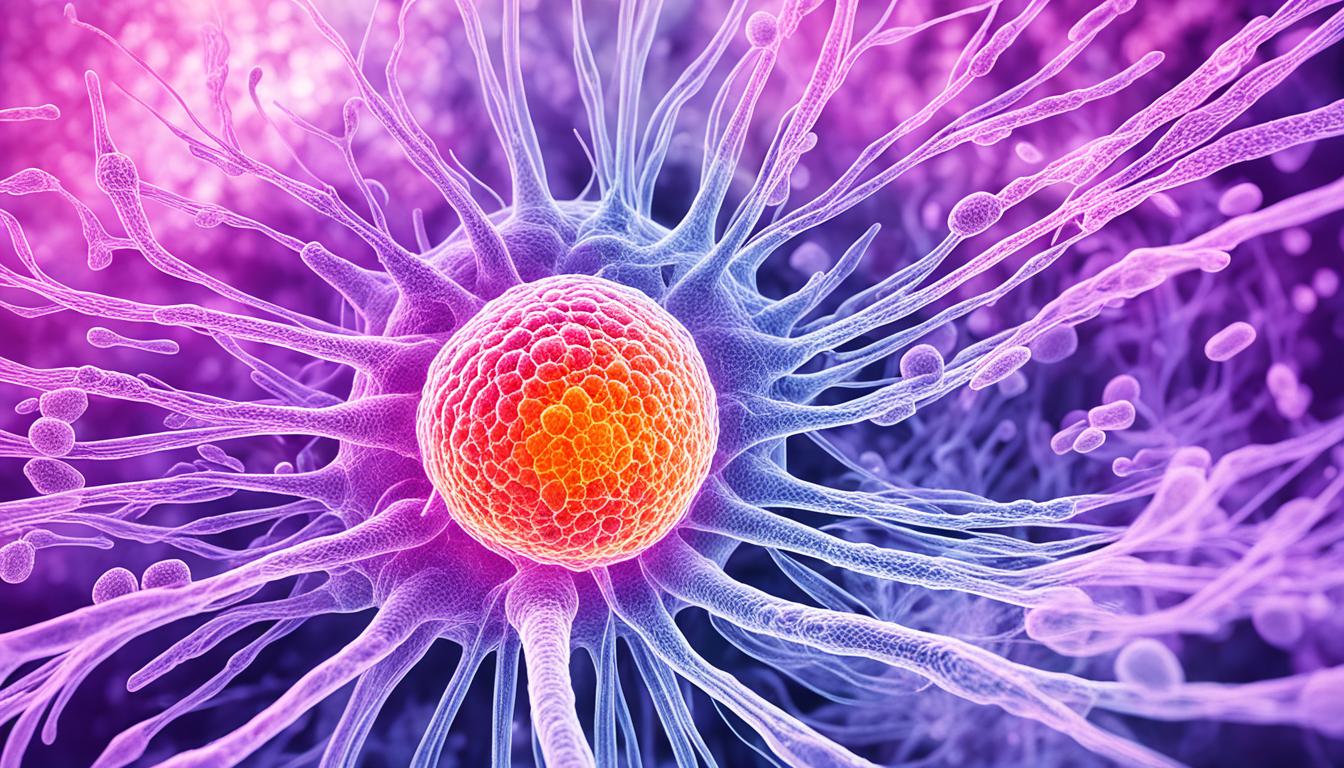About 1.6 million people worldwide have ulcerative colitis. It’s more common from age 15 to 30. This condition is thought to be incurable, but treatment is advancing quickly.
The exact cause of ulcerative colitis is unclear. It might be linked to how the immune system acts. It usually affects the colon and can cause symptoms like bloody diarrhea and belly pain. To diagnose it, doctors do blood tests and look inside the colon with special cameras.
Treatment normally includes using drugs to reduce inflammation. Sometimes surgery is needed. Yet, these options can be limited. Because of this, doctors are looking into using stem cell therapy. It seems to help by reducing the inflammation and helping the body’s tissues recover.
Key Takeaways:
- Ulcerative colitis is a chronic inflammatory bowel disease that affects the colon.
- Symptoms of ulcerative colitis include bloody diarrhea, lower abdominal pain, and frequent bowel movements.
- Diagnosis of ulcerative colitis involves various laboratory and instrumental studies.
- Standard treatment for ulcerative colitis involves the use of anti-inflammatory drugs, corticosteroids, and immunosuppressants.
- Stem cell therapy is a promising alternative approach for treating ulcerative colitis.
Stem Cell Therapy for Ulcer Rectal Disease
Stem cell therapy is promising for treating ulcerative colitis. This is a type of ulcer rectal disease. Studies show that a specific type of stem cell, called mesenchymal stem cells (MSCs), help with diseases like ulcerative colitis.
MSCs come from a person’s own bone marrow, fat, or blood. They have properties that make them great for treating immune diseases like ulcerative colitis. When these cells are put into the body, they do several helpful things. They reduce inflammation, help heal tissue, and control the immune system.
Ulcer rectal
Compared to usual treatments, stem cell therapy can work a lot better. Patients with ulcerative colitis have seen big improvements with this therapy. It’s also safer, with no serious side effects known.
Therapeutic Effects and Regenerative Properties
Stem cell therapy works in many ways to help with ulcer rectal disease. It brings in lots of healthy cells that boost the immune system. These cells go to the colon, reduce inflammation, and help in healing. This not only aids recovery but also makes patients feel better and stronger. It can even make the colon look better.
MSCs are good at helping the colon tissues to regrow and repair. This way, the therapy can solve the main problem behind ulcerative colitis. It helps patients in the long term.
Mesenchymal stem cells, treatment of ulcerative colitis, regenerative properties
The Role of the Immune System and Inflammation
The immune system and inflammation are key in ulcerative colitis. Stem cell therapy changes the immune response. It lowers inflammation and stops more damage to the colon tissue.
By working on the immune system and inflammation, stem cell therapy fights the main cause of ulcer rectal disease. This leads to better symptoms and well-being for patients.
| Treatment Benefits | Traditional Treatments | Stem Cell Therapy |
|---|---|---|
| Reduces inflammation | ✓ | ✓ |
| Promotes tissue regeneration | ✕ | ✓ |
| Long-term benefits | ✕ | ✓ |
| Safe with no serious side effects | ✓ | ✓ |
Conclusion
Ulcerative colitis, or ulcer rectal disease, is a long-term problem of the colon. It’s known as a chronic inflammatory bowel disease. So far, there’s no cure for it, despite progress in treatments. These include drugs to fight inflammation and even meds to lower the immune system.
Yet, stem cell therapy could change this. It uses mesenchymal stem cells to fight inflammation and boost the healing of tissues. This new type of treatment might help a lot in the long run by tackling the root cause.
As science grows, so does the potential of stem cell therapy. It might be a key player in regenerative medicine for those with ulcerative colitis. More studies and developments could lead to a major breakthrough for this challenging illness.

